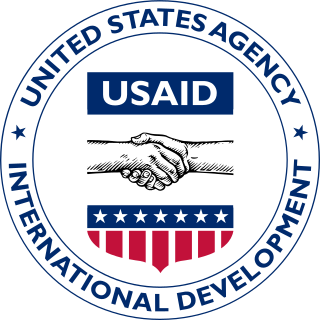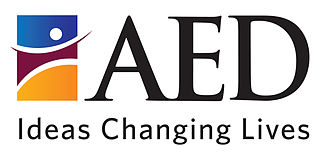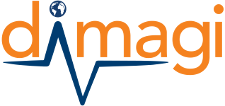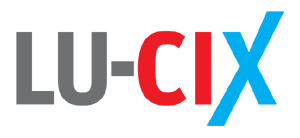Related Research Articles
Telecommunications in Iraq include radio, television, fixed and mobile telephones, and the Internet as well as the postal system.

Telecommunications in Armenia involves the availability and use of electronic devices and services, such as the telephone, television, radio or computer, for the purpose of communication. The various telecommunications systems found and used in Armenia includes radio, television, fixed and mobile telephones, and the internet.

The United States Agency for International Development (USAID) is an independent agency of the U.S. federal government that is primarily responsible for administering civilian foreign aid and development assistance. With a budget of over $27 billion, USAID is one of the largest official aid agencies in the world and accounts for more than half of all U.S. foreign assistance—the highest in the world in absolute dollar terms.

Internet access is the ability of individuals and organizations to connect to the Internet using computer terminals, computers, and other devices; and to access services such as email and the World Wide Web. Internet access is sold by Internet service providers (ISPs) delivering connectivity at a wide range of data transfer rates via various networking technologies. Many organizations, including a growing number of municipal entities, also provide cost-free wireless access and landlines.

George Thomas "Mickey" Leland III was an anti-poverty activist who later became a congressman from the Texas 18th District and chair of the Congressional Black Caucus. He was a Democrat.

An information infrastructure is defined by Ole Hanseth (2002) as "a shared, evolving, open, standardized, and heterogeneous installed base" and by Pironti (2006) as all of the people, processes, procedures, tools, facilities, and technology which support the creation, use, transport, storage, and destruction of information.

Ariel Atias is an Israeli politician who served as a member of the Knesset for Shas, and as the country's Minister of Housing and Construction. He was also manager of Shas' kosher supervision organization, Badatz Beit Yosef. On 22 June 2014, he handed his resignation from the Parliament, citing his departure from the political scene.

Internet censorship is the legal control or suppression of what can be accessed, published, or viewed on the Internet. Censorship is most often applied to specific internet domains but exceptionally may extend to all Internet resources located outside the jurisdiction of the censoring state. Internet censorship may also put restrictions on what information can be made internet accessible. Organizations providing internet access – such as schools and libraries – may choose to preclude access to material that they consider undesirable, offensive, age-inappropriate or even illegal, and regard this as ethical behaviour rather than censorship. Individuals and organizations may engage in self-censorship of material they publish, for moral, religious, or business reasons, to conform to societal norms, political views, due to intimidation, or out of fear of legal or other consequences.

AED, formerly the Academy for Educational Development, was a 501(c)(3) nonprofit organization that focused on education, health and economic development for the "least advantaged in the United States and developing countries throughout the world." AED operated more than 250 programs in the United States and in 150 other countries around the world.
The Internet in Sweden was used by 94.0% of the population, the fourth highest usage rate in the world, behind only the Falkland Islands (96.9%), Iceland (96.0%), and Norway (95%) in 2015. Sweden ranks 18th and 5th highest in the world in terms of the percentage of its fixed and wireless broadband subscriptions. It has the second fastest average internet connection speed in the world.
Like many developed and developing countries, the Internet in Bangladesh has witnessed significant growth. Although facing many constraints in expanding Internet access and use, development of the Internet and Information Technology are high government priorities. In March, 2021 Internet users in Bangladesh increased to 116 million. On 19 February 2018, Bangladesh started the 4G network service.
Troy Cablevision is a regional cable television, cable internet, Security Systems, and Voice over Internet Protocol (VoIP) provider that serves Southeast Alabama. Its motto is "Your Hometown Communications Company". It is currently the only cable TV provider in the country that carries Pursuit Channel 24 hours a day. Currently, their services include Cable Television, Digital telephone, Broadband and Security Systems. Their employees are based in Alabama, from network engineers to receptionists – all the way to the CEO.
Netbooks are small laptops, with screen sizes between approximately 7 and 12 inches and low power consumption. They use either an SSD or a HDD for storage, have up to 2 gigabytes of RAM, lack an optical disk drive, and usually have USB, Ethernet, WiFi and often Bluetooth connectivity. The name emphasizes their use as portable Internet appliances.

Health in Angola is rated among the worst in the world.

The Wayback Machine is a digital archive of the World Wide Web founded by the Internet Archive, a nonprofit based in San Francisco, California. Created in 1996 and launched to the public in 2001, it allows the user to go "back in time" and see how websites looked in the past. Its founders, Brewster Kahle and Bruce Gilliat, developed the Wayback Machine to provide "universal access to all knowledge" by preserving archived copies of defunct web pages.
The Electoral Institute for Sustainable Democracy in Africa, or EISA, is an organization founded in 1996 in Johannesburg to "promote credible elections, participatory democracy, human rights culture and the strengthening of governance institutions for the consolidation of democracy in Africa."
Telenor Objects AS is a Norwegian service provider within machine-to-machine communication, and constitutes one of the two Telenors strategic initiatives to catch the market for M2M, or connected objects. It is a wholly owned subsidiary of Telenor ASA, the incumbent telecommunications company in Norway. Telenor's M2M initiative is organized through Telenor Next - with Telenor Objects and Telenor Connexion serving customers in each part of the value chain, low and high in the valiue-chain, respectively. Telenor Objects grew out of Telenor R&I, and is headquartered in Oslo.
Internet censorship in Syria is extensive. Syria bans websites for political reasons and arrests people accessing them. Filtering and blocking was found to be pervasive in the political and Internet tools areas, and selective in the social and conflict/security areas by the OpenNet Initiative in August 2009.

Dimagi, Inc. is a for-profit social enterprise based in Cambridge, Massachusetts, USA, that delivers open-source software technology suitable for low-resource settings and underserved communities. The company designs clinical interfaces, health information systems, and mobile technologies to perform patient-level disease management, clinical decision support, and health system monitoring. It also provides implementation services on open-source information and technology. Dimagi became a certified B corporation in 2008 and an incorporated benefit corporation in 2012. Dimagi has additional offices in Washington DC, New Delhi, India and Cape Town, South Africa.

The Luxembourg Internet eXchange is a carrier and neutral internet exchange point (IX) located in Luxembourg.
References
- ↑ Singel, Ryan. "Unrepentant Hippie and World Networker Randy Bush Enters Net's Hall of Fame". Wired. Retrieved 4 June 2016.